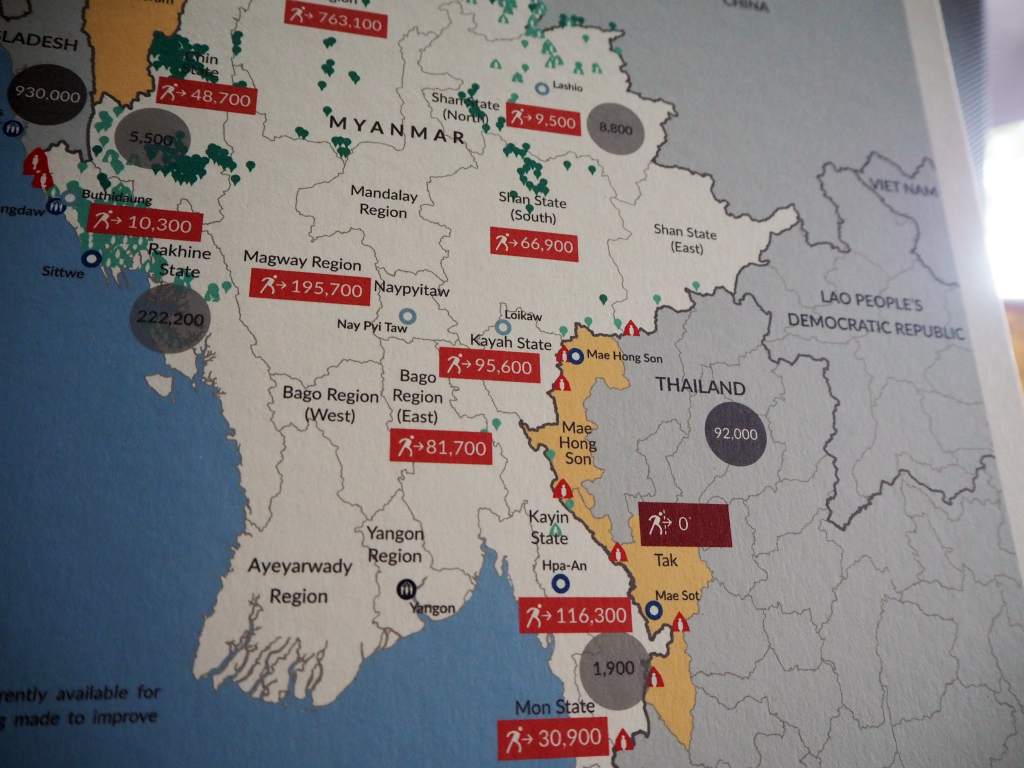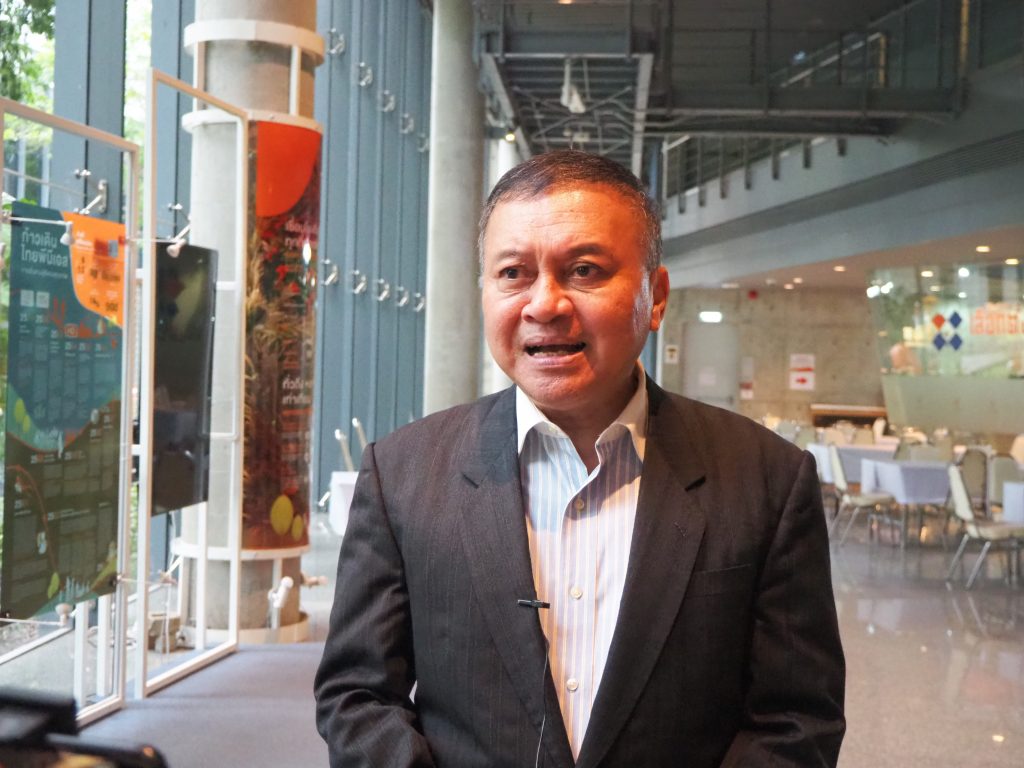COVER: Move Forward Party souvenirs sold during a protest in Bangkok in June 2023
© Visual Rebellion Myanmar
Myanmar diaspora hopes for a new dawn as Thailand votes to shed its green uniform
BANGKOK // After pro-democracy parties led the way in the recent May elections, the Thai Parliament is expected to form a new civilian government. The majority of Thai citizens as well as Myanmar people who took shelter in the neighboring country after the coup, are hoping for a new era that will safeguard their respective rights. However, the new Thai government will have to confront the massive challenges posed by the Myanmar military and the growing refugee crisis.
In the upcoming month, Thailand anticipates a new civilian government for the first time in eight years, as the military-backed and pro-royalist government’s rule comes to an end. The selection of the Prime minister and Parliament president is expected to take place in late July. The election winner, Move Forward Party (MFP), a progressive three-year-old party with a strong following among young people, faces the task of navigating their relationship with both the Thai and Myanmar military.
On July 3rd 2023, the Parliament convened for its first session after the May general election in which the Move Forward Party (MFP) won the most seats (151 out of 500). The selection of the House Speaker went well, ending weeks of national expectation and concern over the disagreement and wrangling for the position among the coalition of eight parties that agreed to form the new government. The result was seen as a compromise between Move Forward and Pheu Thai – the second election winner and the long established political party. The veteran politician Wan Muhamad Noor Matha was nominated for house speaker and two deputy speaker positions were given each to the two main parties. Wan Noor, 79, of the Prachachart Party has been closely allied with Pheu Thai in the past and served in its administration led by billionaire Thaksin Shinawatra.
(Left) Move Forward Party fever after the election © Visual Rebellion Myanmar
(Right) Pheu Thai, the major political party which ranked as second winner of seats, held its final campaign meeting. © Visual Rebellion Myanmar
The MFP campaigned on a platform that included ending military involvement in politics, aligning with the demands of the 2020 pro-democracy movement on the streets. Collaborating with other parties, the MFP aims to implement several progressive agendas, including military reform.
The MFP’s victory not only resonated with young Thai voters but also generated enthusiasm among the Burmese communities, sparking what has been dubbed the “Move Forward Fever.” During a post-election conference, Pita Limjaroenrat, the prime ministerial candidate for the MFP, unveiled his policy on Myanmar, emphasizing the party’s commitment to advancing the Five Point Consensus, a peace plan for Myanmar adopted by ASEAN.
Some organizations such as Human Rights Watch pointed out that “ASEAN has failed to fulfill its pledges or take meaningful steps toward pressing the junta to end its human rights violations” and experts of the Myanmar conflict view the plan as an “empty shell”.
Whichever strategy will be favored, navigating bilateral diplomacy requires cooperation from both sides. The MFP faces the challenge of maintaining its non-military stance while managing relations with the Myanmar military. Additionally, the ever-growing refugee exodus along the Thailand-Myanmar border presents a significant challenge.
Pisan Manawapat, former Ambassador Extraordinary and Plenipotentiary and current member of the Senate, expressed hope that the new government would address the refugee issue. However, he expressed skepticism regarding the acceptance of Thailand’s civilian government by the Myanmar military, suggesting that negotiations should be conducted directly with the military.

The Thailand-Myanmar border, spanning over 2,000 kilometers, has become home to more than 96,000 refugees living in limbo in a dozen refugee camps since the 1990’s. They fled ongoing civil wars that erupted in Myanmar right after its independence from the British empire in 1948. Local organizations estimate the actual number to be much higher, with tens of thousands more arriving after the 2021 coup d’état in Nay Pyi Daw. Additionally, at least three million Burmese migrant workers reside in Thailand, seeking a better future with or without documents.
From a legal standpoint, Thailand does not recognize any refugees within its borders, as it has not ratified the 1951 UN Convention on Refugees. This lack of official recognition poses numerous obstacles in providing humanitarian aid and essential living conditions for people in the camps. Moreover, documented instances of pushbacks of Karen refugees who fled airstrikes further highlight the challenges.
Thailand’s National Security Council, chaired by the current Prime minister General Prayuth Chan-ocha and comprising ten representatives from different authorities, is responsible for refugee issues. However, it has faced widespread criticism from civil society and academics for prioritizing national security over common development.
One example of this approach is the restriction that prevents Myanmar camp residents from leaving the camps to seek employment, despite many possessing valuable skills that could contribute to the Thai economy.
Nevertheless, there may be hope within the military itself. Speculation has arisen about the appointment of a military officer who supports a pro-democracy stance as the Minister of Defense. Among the potential candidates is 67-year-old General Nipat Thonglek, a former director of the Department of Border Affairs. General Nipat, who previously served as permanent secretary for Defense in 2013, was one of the few soldiers to publicly oppose the 2014 coup led by Prayut Chan-o-cha. He has also been involved in the peace process in southern Thailand and served as a nominee for the National Human Rights Commission of Thailand in 2020.
In a June 2023 interview, Gen. Nipat expressed interest in reforming the army, although he acknowledged that the rumors regarding his appointment were unconfirmed. He emphasized the importance of top-down policies to address the refugee issue, suggesting that the new Thai government engage in discussions with the Myanmar military, even if it means involving military personnel in diplomatic efforts.
Thailand’s military personnel have always maintained connections with the Myanmar military, both through official channels and on a personal level. One notable example was the godfather-godson relationship between Min Aung Hlaing, the current commander in chief of the Burmese army who orchestrated the recent coup d’Etat in Myanmar, and Prem Tinsulanonda, the former Thai Prime Minister who, during his tenure, also held the positions of Minister of Defense and Army commander. Prem, who remained influential to some extent in Thai politics until his passing two years ago, was regarded by scholars as the driving force behind the 2006 coup in Thailand.

Many young people from Thailand and Myanmar hope that a new shift in Thai politics could eliminate the entrenched old-power structures that have long influenced the politics of both countries.
The new government also includes Kannavee Suebsang, a veteran refugee advocate, as a member of the House of Representatives. Suebsang, from the Fair Party, has over ten years of experience in peace-building and is the founder of the Peace Rights Foundation. During his tenure at UNHCR Thailand in 2017, Suebsang led efforts to assist Uygur migrants who had been detained for violating immigration laws, with many of them tragically losing their lives while in custody.
Another positive development is the implementation of Thailand’s new legal mechanism, the “National Screening Mechanism” (NSM), set to take effect in September 2023. The NSM, established as a result of a cabinet resolution in December 2021, aims to identify and manage “Protected Persons” who cannot return to their home country due to reasonable fear of persecution.
However, refugee rights advocates remain skeptical about the extent to which the NSM will improve the rights of Myanmar refugees, as it remains unclear how Thai authorities will assess persecution, and there are concerns that the regulations may exclude individuals deemed potential threats to national security.
While Thailand may view migrants from Myanmar as a national security concern, many migrants have spent years on the borderline, which has shaped their attitudes toward the country. Kyaw Kyaw Thein, a Burmese man who fled Myanmar after the political crackdown in 1988, expressed gratitude to the Thai people and government for providing food and shelter at the time he needed it most. After spending three years living in the shadows on the Thailand-Myanmar border, he eventually obtained asylum in the United States, where he worked in a garment factory despite his journalism background.
Kyaw Kyaw Thein emphasized that Thailand has room for improvement in its policies toward refugees, including facilitating urgent humanitarian assistance, streamlining the resettlement process, and considering refugees integration into Thai society. He highlighted that not every refugee can or want to secure asylum in a third country or to return home, making social and economical connections between Thai and Myanmar crucial.